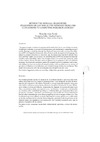Please use this identifier to cite or link to this item:
https://accedacris.ulpgc.es/jspui/handle/10553/57958
| DC Field | Value | Language |
|---|---|---|
| dc.contributor.author | Quintana Toledo, Elena | en_US |
| dc.contributor.author | Sánchez Cuervo, Margarita Esther | en_US |
| dc.date.accessioned | 2019-11-19T15:36:41Z | - |
| dc.date.available | 2019-11-19T15:36:41Z | - |
| dc.date.issued | 2012 | en_US |
| dc.identifier.issn | 0211-5913 | en_US |
| dc.identifier.other | Dialnet | - |
| dc.identifier.uri | https://accedacris.ulpgc.es/handle/10553/57958 | - |
| dc.description.abstract | Este trabajo pretende analizar la presencia de los auxiliares modales can y may como indicadores de evaluación en un corpus de introducciones y conclusiones de artículos de investigación sobre ingeniería informática. Teniendo en cuenta el parecido semántico entre estos dos modales, tomamos como primera referencia el modelo evaluativo de Martin y White, cuyo trabajo se centra en la función interpersonal del lenguaje, la presencia del autor en su obra, y su posicionamiento con respecto a esta y sus lectores. Extendemos a continuación sus nociones sobre modalidad epistémica y evidencialidad, que interpretan desde una perspectiva cotextual y contextual, y utilizamos para ello las ideas de Alonso-Almeida (en prensa) sobre epistemicidad como efecto pragmático de las estrategias evidenciales. Una conclusión importante refl eja la variación funcional de lecturas epistémicas y evidenciales en las dos secciones de los artículos de investigación, predominando las primeras en las introducciones y las segundas en las conclusiones. Este resultado concuerda con el tipo de género y el propósito de los autores | en_US |
| dc.description.abstract | This paper attempts to analyse the presence of the modal auxiliaries can and may as markers of authorial evaluation in a corpus of introductions and conclusions to computing research articles. Bearing in mind the semantic familiarity of these two modals, we start from Martin and White's Appraisal framework, whose focus is on the interpersonal in language, the subjective presence of authors in their texts, and the stances they take both towards those texts and their readers. In particular, we extend Martin and White's notions on epistemic modality and evidentiality, which they interpret from a co-textual and contextual point of view, and use Alonso-Almeida's views on epistemicity as a pragmatic eff ect of evidential strategies. An important conclusion points at functional variation of epistemic and evidential readings in these two sections of research articles, with a predominant occurrence of epistemic attributions in introductions and evidential interpretations in conclusions. This result is in consonance with the type of genre selected and its authors' aims | en_US |
| dc.language | eng | en_US |
| dc.relation.ispartof | Revista canaria de estudios ingleses | en_US |
| dc.source | Revista Canaria de Estudios Ingleses [ISSN 0211-5913], n. 65, p. 131-145 | en_US |
| dc.subject | 570111 Enseñanza de lenguas | en_US |
| dc.subject.other | Appraisal | en_US |
| dc.subject.other | Evaluation | en_US |
| dc.subject.other | Modality | en_US |
| dc.subject.other | Evidentiality | en_US |
| dc.subject.other | Epistemic | en_US |
| dc.subject.other | Research article | en_US |
| dc.subject.other | Evaluación | en_US |
| dc.subject.other | Modalidad | en_US |
| dc.subject.other | Evidencialidad | en_US |
| dc.subject.other | Epistémica | en_US |
| dc.subject.other | Artículo de investigación | en_US |
| dc.title | Beyond the Appraisal Framework: Evaluation of Can and May in Introductions and Conclusions to Computing Research Articles | en_US |
| dc.type | info:eu-repo/semantics/article | en_US |
| dc.type | Article | en_US |
| dc.identifier.url | http://dialnet.unirioja.es/servlet/articulo?codigo=4149353 | - |
| dc.description.lastpage | 145 | - |
| dc.identifier.issue | 65 | - |
| dc.description.firstpage | 131 | - |
| dc.investigacion | Artes y Humanidades | en_US |
| dc.type2 | Artículo | en_US |
| dc.description.notas | Ejemplar dedicado a: Evaluative Uses of Language: The Appraisal Framework | en_US |
| dc.contributor.authordialnetid | 2998076 | - |
| dc.contributor.authordialnetid | 1000472 | - |
| dc.identifier.dialnet | 4149353ARTREV | - |
| dc.identifier.ulpgc | Sí | es |
| dc.description.erihplus | ERIH PLUS | |
| item.grantfulltext | open | - |
| item.fulltext | Con texto completo | - |
| crisitem.author.dept | GIR Discourse, Communication and Society | - |
| crisitem.author.dept | Departamento de Filología Moderna, Traducción e Interpretación | - |
| crisitem.author.dept | GIR Discourse, Communication and Society | - |
| crisitem.author.dept | Departamento de Filología Moderna, Traducción e Interpretación | - |
| crisitem.author.orcid | 0000-0002-1583-808X | - |
| crisitem.author.orcid | 0000-0002-5562-8837 | - |
| crisitem.author.parentorg | Departamento de Filología Moderna, Traducción e Interpretación | - |
| crisitem.author.parentorg | Departamento de Filología Moderna, Traducción e Interpretación | - |
| crisitem.author.fullName | Quintana Toledo, Elena | - |
| crisitem.author.fullName | Sánchez Cuervo, Margarita Esther | - |
| Appears in Collections: | Artículos | |
Page view(s)
257
checked on Jan 15, 2026
Download(s)
118
checked on Jan 15, 2026
Google ScholarTM
Check
Share
Export metadata
Items in accedaCRIS are protected by copyright, with all rights reserved, unless otherwise indicated.
